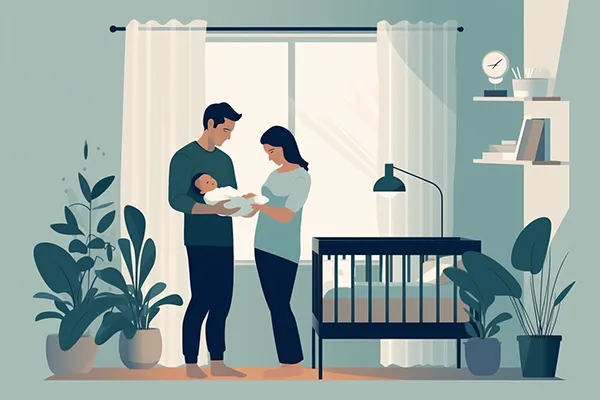Amidst the joy and excitement of a newborn baby, lies a lesser-discussed, overshadowed issue of Men’s Postpartum Depression (PPD).

While traditionally associated with new mothers, postpartum depression is a reality for many new fathers. In fact, 1 out of every 10 fathers experience depression and anxiety. The onset of symptoms, including sadness, anxiety, and irritability, peaks between 3 to 6 months after birth, making the transition to parenthood a challenging endeavor for many.
Understanding Men’s Postpartum Depression
Postpartum depression in men shows up differently compared to women. One of the largest differences is that men are less likely to express emotions outwardly like crying, and are more likely to internalize their emotions. The internalizing of emotions, however, can be equally debilitating, making it essential to address and seek support for this condition.
Prevalence: A Closer Look
Research has shown that close to 13% of men in the US experience paternal depression during the mother’s pregnancy and up to one year postpartum. Also, in cases where their partners are going through postpartum depression, between 25% to 50% of men experience PPD as well. The highest levels of depression occurred within the first 3 to 6 months postpartum. In addition to depression, men are just as likely to experience anxiety both before and after the baby is born. In a meta-analysis of 23 studies, the authors found that almost 11% of men experience perinatal anxiety.
While a good amount of research shows that male PPD is real, a lot of men don’t know about it. This lack of knowledge helps keep the stigma or negative views around mental health in new dads. So, the big challenge is two-sided: letting men know about this issue and helping them get the support they need. Moreover, creating a supportive space is really important for starting conversations and getting help on time. By tackling these two main challenges, we can make a big positive change for new dads’ mental health.
Risk Factors of Paternal PPD
There are a number of factors that can make men more likely to get postpartum depression. Paternal depression and anxiety sometimes start during the mother’s pregnancy. In a meta-analysis of 23 studies, the authors found that almost 11% of men experience perinatal anxiety. Additionally, the authors found that the highest risk for depression among new fathers was in the first trimester.
Other risk factors include:
- Family History plays a part in paternal depression. Any history of depression or anxiety in a father’s family increases the risk of PPD.
- Partner depression – 25% – 50% of men show signs of depression when the mother does too.
- Funny as it might sound, hormones can play a part too. In a study of 29 couples over the course of 36 weeks, the authors found that men experienced significant declines in testosterone. Decreased testosterone increases the likelihood of depression in men. However, one study suggested that lower testosterone levels increase closeness in relationships, so it’s not all bad news.
- Decreased sleep plays a huge role in depression no matter what the circumstances are. New parents may not realize just how much sleep they are going to lose with a new baby. Not only does a lack of sleep increase the likelihood of depression it is also linked to higher levels of anxiety.
The effects ripple through the family, affecting relationships and the overall family harmony. Symptoms such as loss of interest in activities, irritability, avoidance behavior, and difficulty making decisions could become daily hurdles. Other issues may even affect the child.
Signs of Men’s Postpartum Depression
Paternal postpartum depression can range in symptoms and severity. Regardless, keeping an eye on the following indicators of depression is helpful to know for anyone. More common symptoms include:
- Irritability
- Suicidal behaviors and thoughts
- Decreased interest in activities or lower motivation for participating in activities
- Difficulty with concentration or decision-making (sort of like analysis paralysis)
- Sudden outbursts of emotions including anger, frustration, and sadness
- Increased impulsivity or risk-taking behaviors
- Withdrawing from relationships and decreased esteem
- Increase or decrease in work
In addition to these symptoms, anxiety can also be a factor. In a meta-analysis of 23 studies, the authors found that almost 11% of men experience perinatal anxiety. Anxiety shows up in a number of ways but it is important to put the following in the context of becoming a father:
- Excessive worry – This would be worry outside of normal future parenting. In some cases, the worry can be overwhelming and unreasonable.
- Increased sense of panic or nervousness. – This too may look like excessive worry.
- Compulsive preoccupation with safety or preparedness. It’s always important to be ready when a baby arrives but if the preparedness becomes debilitating to normal life functioning there may be concern.
Getting the support needed
While therapy may be helpful it is not necessarily the best medicine. Support groups on the other hand are far more helpful for a number of reasons. Men’s support groups create an environment of comradery through similar lived experiences. It creates a community of men who are dealing with similar life changes and share that experience with each other. These types of groups are not therapy but are definitely therapeutic.
Therapy has also proven to be helpful when symptoms of PPD become severe. This type of therapy is short-term and often centers around expressing frustrations, worries, and fears in a safe and confidential environment.
Determining if you need a support group or therapy may be easier evaluated by contacting a provider. If you are a new father or a father-to-be, you can always call or contact me to find out what would be best. You can also find out more about Men’s Therapy here.
There are no bad questions
Understanding and addressing Men’s Postpartum Depression is a step towards fostering healthier families. If you or a loved one is experiencing symptoms of PPD, remember, help is available. If you would like to discuss this further with me, feel free to complete the form below or give me a call and we can chat.

